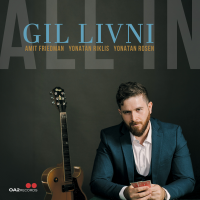By Steve Provizer
If you're an improviser who completely lacks confidence, you'll never get out of the practice room, but if you have no fear, you won't find The Edge. Most of us struggle to find a balance between the two.
Some people have no fear in a studio, but freeze up in front of audiences. More commonly, people fear the trappings of the recording studio (much more true before technology allowed infinite edits). In both cases, the caution that seeps in can make you retreat into your bag of creaky riffs.
On the other hand, a complete dearth of fear can cause problems. A photographic memory and all the technique in the world can induce complacency and drain the life out of a performance.
I'm sure we've all heard this, or felt it. It's a phenomenon that often comes wrapped in a bundle of 32nd notes, in a long visit to stratospheric registers, or as rapid virtuosic register shifts. Despite all this musical artillery, something seems to be missing. The example that sticks out for me-because it was the biggest disappointment-was a Freddie Hubbard gig I heard at Boston's Jazz Workshop in the 70's. Freddie could play the crap out of the trumpet, but as I listened to a cascade of notes, played by a man whose early recordings I'd worn out, I was unmoved. He just didn't seem to be giving anything up, emotionally. Despite the financial sacrifice I'd made to get in, I didn't stay for the second set.
God knows it's tempting say you'd sell your soul for more chops. But, as in the Myth of Fame I talked about, the point is that we have to find our own points of calibration. This personal excavation is damned hard to do-and if there's any reason why artists should occasionally be cut some slack for selfishness and other loathsome behavior, this might be it.
If you're an improviser who completely lacks confidence, you'll never get out of the practice room, but if you have no fear, you won't find The Edge. Most of us struggle to find a balance between the two.
Some people have no fear in a studio, but freeze up in front of audiences. More commonly, people fear the trappings of the recording studio (much more true before technology allowed infinite edits). In both cases, the caution that seeps in can make you retreat into your bag of creaky riffs.
On the other hand, a complete dearth of fear can cause problems. A photographic memory and all the technique in the world can induce complacency and drain the life out of a performance.
I'm sure we've all heard this, or felt it. It's a phenomenon that often comes wrapped in a bundle of 32nd notes, in a long visit to stratospheric registers, or as rapid virtuosic register shifts. Despite all this musical artillery, something seems to be missing. The example that sticks out for me-because it was the biggest disappointment-was a Freddie Hubbard gig I heard at Boston's Jazz Workshop in the 70's. Freddie could play the crap out of the trumpet, but as I listened to a cascade of notes, played by a man whose early recordings I'd worn out, I was unmoved. He just didn't seem to be giving anything up, emotionally. Despite the financial sacrifice I'd made to get in, I didn't stay for the second set.
God knows it's tempting say you'd sell your soul for more chops. But, as in the Myth of Fame I talked about, the point is that we have to find our own points of calibration. This personal excavation is damned hard to do-and if there's any reason why artists should occasionally be cut some slack for selfishness and other loathsome behavior, this might be it.

























